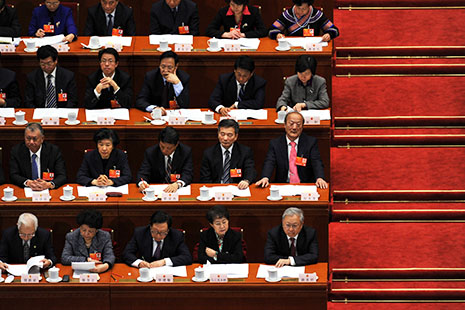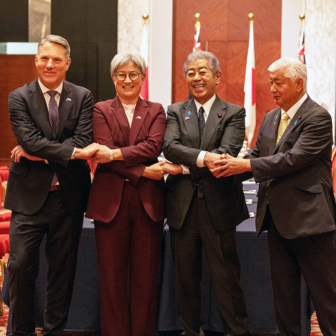MARCH is meeting time in Beijing – time for the annual gathering of the National People’s Congress, or NPC, China’s rubber-stamp national parliament, and the Chinese People’s Political Consultative Conference, or CPPCC, the even more symbolic “advisory body” comprised of minor parties and big individuals. Together, these “Two Meetings” (or lianghui as they are known in Chinese) bring over ten thousand celebrities, delegates, handlers and journalists to our already overcrowded city.
But this year things seem different. Cars are moving smoothly along the roads but the air is more toxic than ever. It is yet another case of cognitive dissonance: to live in China and begin to make sense of its society, one must be comfortable with the sort of mental gymnastics that embraces deep paradoxes. And this year’s Two Meetings are a powerful reminder of the deep contradictions that run through Chinese society.
Last year, Chinese social media was abuzz about the haute couture of delegates: Burberry bags, Hermes belts and Emilio Pucci pants-suits. This year, a new aura of austerity has hit the capital as part of the drive by incoming president and new Communist Party chief Xi Jinping to clean up Chinese politics.
Xi has ordered an end to lavish welcoming ceremonies and the traffic restrictions that clear the roadways for visiting dignitaries. Expensive French wine, lobster and shark fin soup are off the menu, replaced with modest, alcohol-free, “four dish, one soup” buffets. Deputies adopt far more modest and dour attire. And there is even talk of carpooling among delegates.
The propaganda system, meanwhile, is in overdrive, emphasising the democratic and egalitarian nature of the Two Meetings and attempting to put the “people” back in the People’s Republic of China. The media is filled with stories about ordinary delegates and statistics revealing how representative the two forums are. We are told that there are more women, youths, migrant workers, peasants and ethnic minorities among this year’s delegates, with the 699 female NPC delegates, for example, making China’s legislature more gender diverse than the US Congress or the Japanese Diet.
Take two of the “grassroots delegates” on display at a 10 March press conference. Liu Li, dubbed the “most beautiful masseuse in China,” is a migrant worker from Xiamen who was elected as a delegate from her native Anhui province. Among her proposals for the NPC are better standards for foot massages.
Not to be outdone, twenty-year-old NPC delegate Tie Feiyan has been hailed “the most beautiful girl born after 1990” by Chinese netizens. This road toll collector from Yunnan province, who was supposedly “elected” for rescuing four drowning workers, ticks all the right boxes – she is a young, female migrant worker from the Hui ethnic minority who has even adopted an abandoned infant – despite the fact that she admits to not being familiar with her duties as a delegate.
But this is mere window-dressing: a colourful set of blackout curtains to hide the real wealth and power that now controls Chinese society. In fact, the Two Meetings are the biggest gathering of the mega-rich in the world today. Think Davos on steroids.
According to the Financial Times, at least 135 billionaires are in town as delegates of the NPC or CPPCC (up 17 per cent from last year), and this doesn’t even include mere millionaires like Jackie Chan and Yao Ming, both CPPCC delegates. In sharp contrast to the state media’s emphasis on forgoing lavish hotels and bringing one’s own toothbrush, the number of official cars with blackened windows going in and out of the nearby luxury 5-star Grand Millennium Hotel speaks differently.
Not surprisingly, China’s income gap is now one of the largest in the world. While Chinese farmers and migrant workers earn less than US$1500 per year on average, it was revealed last year that the wealth of Xi Jinping’s extended family tops US$376 million, and that pales in comparison with the estimated US$2.7 billion in assets amassed by the family of outgoing premier Wen Jiabao.
In today’s China, the “red aristocracy”– an informal alliance between “princeling” politicians and their business cronies – runs the show. And to make sure that their booty remains safe, millions of dollars in “hot money” flows out of the country each year. Others have obtained foreign passports as protection. According to the Hong Kong-based Oriental Daily, more than half of NPC and CPPCC delegates hold either a foreign passport or overseas residency rights.
The apex of political power rests with the Chinese Communist Party and its Politburo and Central Committee. Here one finds a bunch of men cut from the same elite, male cloth. Not only are there no migrant workers here, there are only two women and no minorities among this twenty-five-member governing body, and none among the new seven-man Standing Committee.
In fact, the figures reveal that there are now fewer women and ethnic minorities at the top ranks of Chinese politics. This year’s “Tibet delegation” at the NPC includes both Wang Huning, the Shanghai-native Politburo member, and Chang Xiaobing, the Beijing-based China Unicom chief and party member, part of the practice of allocating Han men from the elite to less populous delegations.
At this year’s Two Meetings, like those in years past, delegates will consider a range of new proposals aimed at improving China’s environment, including efforts to reduce air and water pollution. Leading the way, the CPPCC decided to take its use of cheap, degradable calcium carbonate paper a step further and go paperless, with proposals and speeches distributed digitally for the first time. These efforts have come too late to help curb the miasma of toxic pollution plaguing Beijing this winter.
Of late, the sun is a rare sight here, causing many expats to consider packing their bags. On most days residents are greeted with a noxious soup of smog, fog and now sand. In January and February, the city witnessed a record string of days off the scales on the Air Quality Index, which stops at 500 (with readings above 300 deemed “hazardous” and “emergency conditions” by the American Environmental Protection Authority). On 12 January, the Beijing index topped a record-breaking 993.
According to one report, it’s like living in an airport smoking lounge. Several of the international schools here have even taken to building massive, air-filtered plastic bubbles over their sports fields. My kids are less fortunate, with students confined to the main school building when the index reaches 250.
Yet, like spring itself, the annual Two Meetings always bring hope. This month’s gatherings conclude China’s once-in-a-decade leadership transition, with a new set of leaders promising to shake things up. At his inaugural speech as secretary-general, Xi admitted that the party faces “many severe challenges,” including corruption and being out of touch with the common folk. He stressed that “to forge iron, one must be strong,” and warned that “our responsibility is weightier than Mount Tai, and our road ahead is a long one.”
It is too early to tell whether Xi Jinping will lead his people over the mountain of vested interests in achieving what he calls the “China dream.” For the moment, however, things continue on course, minus the caviar and the fresh air. •




